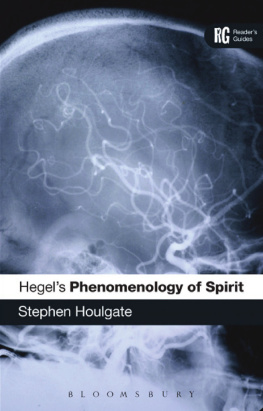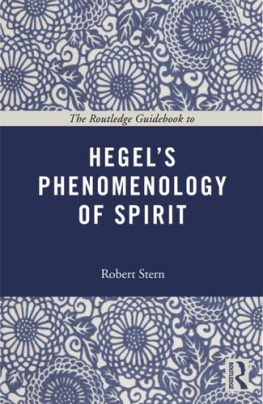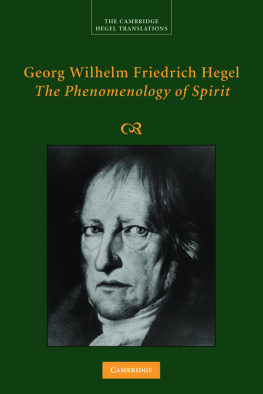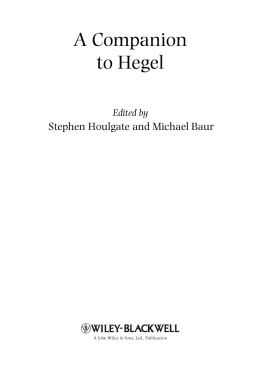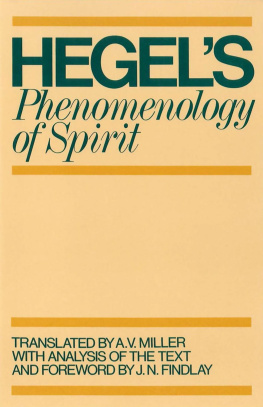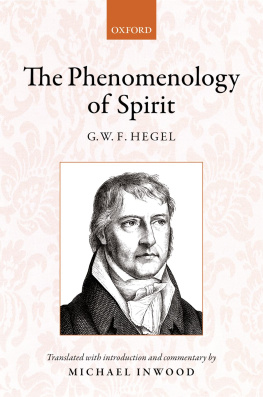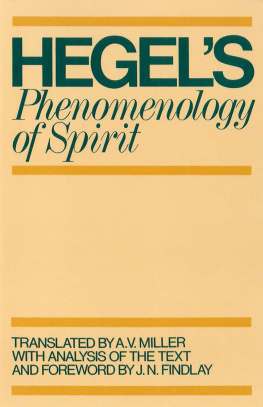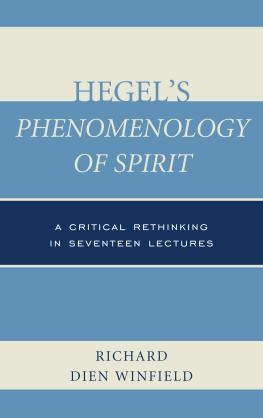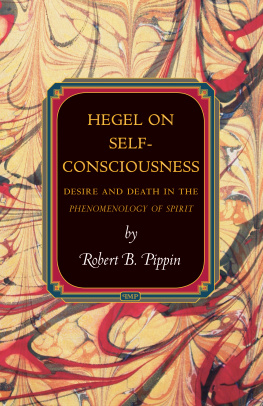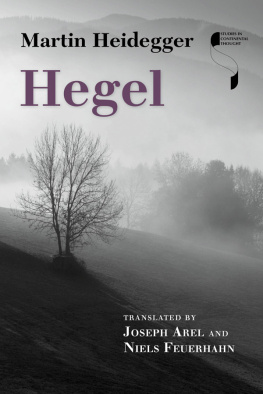Stephen Houlgate - Hegel’s ’Phenomenology of Spirit’: A Reader’s Guide
Here you can read online Stephen Houlgate - Hegel’s ’Phenomenology of Spirit’: A Reader’s Guide full text of the book (entire story) in english for free. Download pdf and epub, get meaning, cover and reviews about this ebook. year: 0, genre: Religion. Description of the work, (preface) as well as reviews are available. Best literature library LitArk.com created for fans of good reading and offers a wide selection of genres:
Romance novel
Science fiction
Adventure
Detective
Science
History
Home and family
Prose
Art
Politics
Computer
Non-fiction
Religion
Business
Children
Humor
Choose a favorite category and find really read worthwhile books. Enjoy immersion in the world of imagination, feel the emotions of the characters or learn something new for yourself, make an fascinating discovery.
- Book:Hegel’s ’Phenomenology of Spirit’: A Reader’s Guide
- Author:
- Genre:
- Year:0
- Rating:5 / 5
- Favourites:Add to favourites
- Your mark:
- 100
- 1
- 2
- 3
- 4
- 5
Hegel’s ’Phenomenology of Spirit’: A Reader’s Guide: summary, description and annotation
We offer to read an annotation, description, summary or preface (depends on what the author of the book "Hegel’s ’Phenomenology of Spirit’: A Reader’s Guide" wrote himself). If you haven't found the necessary information about the book — write in the comments, we will try to find it.
Hegel’s ’Phenomenology of Spirit’: A Reader’s Guide — read online for free the complete book (whole text) full work
Below is the text of the book, divided by pages. System saving the place of the last page read, allows you to conveniently read the book "Hegel’s ’Phenomenology of Spirit’: A Reader’s Guide" online for free, without having to search again every time where you left off. Put a bookmark, and you can go to the page where you finished reading at any time.
Font size:
Interval:
Bookmark:
Hegels Phenomenology of Spirit
Stephen Houlgate
READERS GU I DES
Readers Guides are clear, concise and accessible introductions to key texts in literature and philosophy. Each book explores the themes, context, criticism and influence of key works, providing a practical introduction to close reading, guiding students towards a thorough understanding of the text. They provide an essential, up-to-date resource, ideal for undergraduate students.
Readers Guides available:
Aristotles Nicomachean Ethics , Christopher Warne
Aristotles Politics , Judith A. Swanson
Badious Being and Event , Christopher Norris
Berkeleys Principles of Human Knowledge , Alasdair Richmond
Berkeleys Three Dialogues , Aaron Garrett
Deleuze and Guattaris Anti-Oedipus , Ian Buchanan
Deleuzes Difference and Repetition , Joe Hughes
Derridas Writing and Difference , Sarah Wood
Descartes Meditations , Richard Francks
Hegels Philosophy of Right , David Edward Rose
Heideggers Being and Time , William Blattner
Heideggers Later Writings , Lee Braver
Hobbess Leviathan , Laurie M. Johnson Bagby
Humes Dialogues Concerning Natural Religion , Andrew Pyle
Kants Critique of Aesthetic Judgement , Fiona Hughes
Kants Critique of Pure Reason , James Luchte
Kants Groundwork for the Metaphysics of Morals , Paul Guyer
Kierkegaards Fear and Trembling , Clare Carlisle
Lockes Second Treatise of Government , Paul Kelly
Mills On Liberty , Geoffrey Scarre
Mills Utilitarianism , Henry R. West
Nietzsches Beyond Good and Evil , Christa Davis Acampora and Keith Ansell Pearson
Nietzsches On the Genealogy of Morals , Daniel Conway
Nietzsches The Birth of Tragedy , Douglas Burnham
Platos Republic , Luke Purshouse
Platos Symposium , Thomas L. Cooksey
Rawlss A Theory of Justice , Frank Lovett
Rousseaus The Social Contract , Christopher D. Wraight
Sartres Being and Nothingness , Sebastian Gardner
Schopenhauers The World as Will and Representation , Robert L. Wicks
Spinozas Ethics , J. Thomas Cook
Wittgensteins Philosophical Investigations , Arif Ahmed
Wittgensteins Tractatus Logico-Philosophicus , Roger M. White
Forthcoming:
Deleuze and Guattaris A Thousand Plateaus , Eugene W. Holland
Deleuze and Guattaris What is Philosophy? , Rex Butler
Machiavellis The Prince , Miguel Vatter
Nietzsches Thus Spoke Zarathustra , Clancy Martin
Bloomsbury Academic
An imprint of Bloomsbury Publishing Pic
50 Bedford Square 175 Fifth Avenue
London New York
WC1B 3DP NY 10010
UK USA
www.bloomsbury.com
First published 2013
Stephen Houlgate, 2013
All rights reserved. No part of this publication may be reproduced or transmitted in any form or by any means, electronic or mechanical, including photocopying, recording, or any information storage or retrieval system, without prior permission in writing from the publishers.
Stephen Houlgate has asserted his right under the Copyright, Designs and Patents Act, 1988, to be identified as Author of this work.
No responsibility for loss caused to any individual or organization acting on or refraining from action as a result of the material in this publication can be accepted by Bloomsbury Academic or the author.
British Library Cataloguing-in-Publication Data
A catalogue record for this book is available from the British Library.
ISBN: HB: 978-0-8264-8510-6
e-ISBN: 978-1-4411-8085-8
Library of Congress Cataloging-in-Publication Data
Houlgate, Stephen.
Hegels Phenomenology of spirit: a readers guide/Stephen Houlgate.
p. cm. (Readers guides)
Includes bibliographical references (p.) and index.
ISBN 978-0-8264-8510-6 (hardcover) ISBN 978-0-8264-8511-3 (pbk.) ISBN 978-1-4411-8085-8 (ebook (pdf)) ISBN 978-1-4411-3455-4 (ebook (epub))
1. Hegel, Georg Wilhelm Friedrich, 1770-1831. Phnomenologie des Geistes.
2. Spirit. 3. Consciousness. 4. Truth. I. Title.
B2929.H68 2012
193-dc23
2012012761
Typeset by Deanta Global Publishing Services, Chennai, India
The purpose of this book is to provide a guide to reading Hegels Phenomenology of Spirit . There are many fine commentaries that explore the historical background to, and philosophical relevance of, Hegels text, but this guide aims specifically to help students follow the twists and turns of that text itself. My guiding principle is that the Phenomenology sets out a single, continuous, logical argument, whose details are to be taken seriously. It has to be admitted that this argument is, at times, horribly convoluted. I have made every effort, however, to present the argument as clearly as possible, and I hope that, with the help of this book, students will be able to understand and assess it for themselves.
Due to the considerable length of the Phenomenology , it is not possible in this guide to provide a detailed account of each stage of Hegels argument. I have chosen, therefore, to give detailed accounts of the first four chapters of the book, which set out the development of consciousness and self-consciousness. These are the chapters with which most students are likely to start, and they also contain the famous analyses of sense-certainty, the master-slave relation and the unhappy consciousness. The remaining chapters on reason, spirit, religion and absolute knowing are also important and fascinating, but space is limited. My hope, therefore, is that students can learn from my account of the first four chapters to make headway in Hegels text on their own, and that they will then be able to engage with the missing details from chapters five to eight by themselves.
My aim throughout this guide has been to explain how the argument of the Phenomenology proceeds and, by implication, why it might be deemed successful. I have not, therefore, considered specific criticisms of Hegels ideas; nor, with rare exceptions, have I commented on the interpretations of other readers of Hegel. In view of this, I should like to express in this preface my gratitude to the many other readers, whose work, over the years, has helped me understand Hegels Phenomenology better. A list of some of their works is provided in the Guide to Further Reading at the end of this book.
The translation used in this Readers Guide is G. W. F. Hegel, Phenomenology of Spirit , trans. A. V. Miller (Oxford: Oxford University Press, 1977). This translation is divided into 808 paragraphs, and it has become common in much English-language secondary literature on the Phenomenology to make reference to these paragraphs. I have thus followed this convention in this guide. I have also made reference to the following German edition: G. W. F. Hegel, Phnomenologie des Geistes , ed. H.-F. Wessels and H. Clairmont (Hamburg: Felix Meiner Verlag, 1988). References to the Phenomenology are thus given in this guide in the following form (with the English text first, and the German text second): 90/69. Students who read German will find Hegel easier to read and understand in the original language, and I would strongly encourage them to consult the German edition, whenever possible.
Hegel is a striking stylist and Millers translation also provides many memorable passages. There are times, however, when Millers version needs correcting. I have thus amended his translation whenever this was necessary. I have not indicated that a change has been made, unless such a change means that students can no longer find the relevant passage in the translation. In this case, a note has been added giving Millers wording. Translations of other works by Hegel have also been amended, where necessary.
Font size:
Interval:
Bookmark:
Similar books «Hegel’s ’Phenomenology of Spirit’: A Reader’s Guide»
Look at similar books to Hegel’s ’Phenomenology of Spirit’: A Reader’s Guide. We have selected literature similar in name and meaning in the hope of providing readers with more options to find new, interesting, not yet read works.
Discussion, reviews of the book Hegel’s ’Phenomenology of Spirit’: A Reader’s Guide and just readers' own opinions. Leave your comments, write what you think about the work, its meaning or the main characters. Specify what exactly you liked and what you didn't like, and why you think so.

